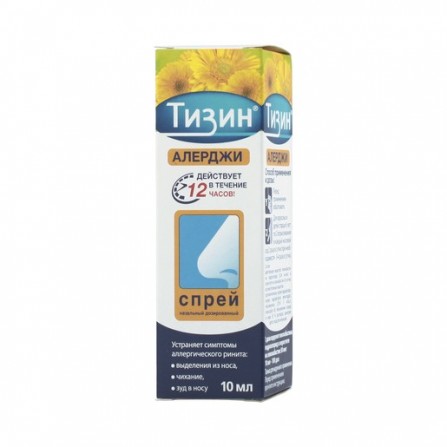Tezin allergy spray nasal 50mkg dose 10ml
Condition: New product
1000 Items
Rating:
Be the first to write a review!

More info
Active ingredients
Levocabastine
Release form
Spray
Composition
1 ml of the preparation contains: levocabastine hydrochloride (0.54 mg) in terms of 0.5 mg of levocabastine, excipients: 48.26 μl of propylene glycol, sodium phosphate 8.66 mg sodium, 5.38 mg sodium phosphate, hypromellose (2910 5 mPa.s) 2.50 mg, polysorbate 80 1.00 mg, benzalkonium chloride 0.15 mg (as a 50% solution of 0.03 ml), disodium edetate 0.15 mg, water for injection up to 1.0 ml.
Pharmacological effect
Levocabastin is a selective blocker of H1-histamine receptors with a long-lasting effect. The local effect occurs after 5 minutes, and the action lasts for 12 hours. After intranasal administration, Tizin Alergi nasal spray eliminates the symptoms of allergic rhinitis: nasal discharge, sneezing, nasal itching.
Pharmacokinetics
Each intranasal administration at a rate of 50 mcg / dose absorbs about 30-40 mcg of levocabastin, the maximum concentration of levocabastin in the blood plasma is reached approximately 3 hours after nasal administration, excreted unchanged by the kidneys with urine. Levocabastin is approximately 55% bound to plasma proteins. The main metabolite of levocabastine, the acylglyu-kuronide, is formed by glucuronization, which is the main pathway for the formation of metabolites. The half-life of levocabastine is about 35-40 hours.
Indications
Symptomatic therapy of seasonal and year-round allergic rhinitis.
Contraindications
Hypersensitivity to any of the components of the drug. Children's age up to 6 years.
Precautionary measures
Patients with impaired renal function and the elderly.
Use during pregnancy and lactation
Reliable data on the use of nasal spray "Tizin Alergi" in pregnant women are not available. Therefore, Tizin Alergi nasal spray should not be used during pregnancy unless the intended benefit to the mother justifies the potential risk to the fetus. Based on the determination of the concentration of levocabastin in the saliva and breast milk of lactating women who received 0.5 mg of levocabastin orally once, it is expected that approximately 0.6% of the total intranasal dose of levocabastin can be passed on to the baby during breastfeeding.Due to the limited number of clinical and experimental data, it is recommended to use caution when applying the Tizin Alergi nasal spray in nursing women. If necessary, the appointment of the drug during lactation should stop breastfeeding.
Dosage and administration
Intranasally for adults and children over 6 years old, 2 doses (100 mcg) in each nasal passage 2 times a day. Use of the drug should be continued until symptoms are eliminated. In the case of severity of symptoms, you can apply 3-4 times a day. Patients should be warned about the need to release the nasal passages before using the spray and inhale through the nose during administration. Before first use, remove the protective cap and press the spray nozzle several times until a mist appears. The bottle is ready for further use. Shake the bottle before each use. Drug inhale through the nose.
Side effects
Adverse events that were observed in y≥1% of patients during clinical studies. On the part of the digestive system: nausea. On the part of the nervous system: headache, drowsiness, dizziness. On the part of the respiratory system: pain in the pharynx and larynx, nosebleeds, cough. Other: fatigue, pain at the injection site. Adverse events reported in ≤ 1% of patients during clinical trials. On the part of the respiratory system: short-term local irritation at the injection site. Other: irritation, pain, dryness, burning, discomfort at the injection site. Post-marketing data Very often (> 1/10), often (> 1/100, <1/10) and not often (> 1/1000, <1/100), rarely (> 1/10000, <1/1000) and very rarely (<1/10000, including isolated cases). Since the cardiovascular system: tachycardia (rare). On the part of the immune system: allergic reactions (not often). On the part of the respiratory system: bronchospasm (frequency unknown), shortness of breath (not often), swelling of the nasal mucosa (rare). Other: malaise (not often), eyelid edema (frequency unknown).
Overdose
Symptoms There have been no reports of an overdose of levoka bastin. If accidental ingestion may reduce blood pressure, tachycardia, slight sedation. Treatment In the case of ingestion, the patient should drink a large amount of fluid in order to speed up the release of levocabastine through the kidneys.
Interaction with other drugs
There was no interaction with alcohol in clinical studies.There was also no increase in the effect of alcohol or diazepam when using the usual dosages of Tizin Alerji nasal spray. The simultaneous use of CYP3A4 isoenzyme inhibitors ketoconazole or erythromycin did not affect the pharmacokinetics of levocabastine when administered nasally. Possible local interactions with other nasal preparations have not been studied enough, with the exception of interaction with oxymetazoline, which can transiently reduce the absorption of levocabastine when administered nasally.
special instructions
If the drug has fallen into disrepair or the expiration date has expired - do not throw it into sewage or on the street! Put the medicine in the bag and put it in the trash. These measures will help protect the environment!




